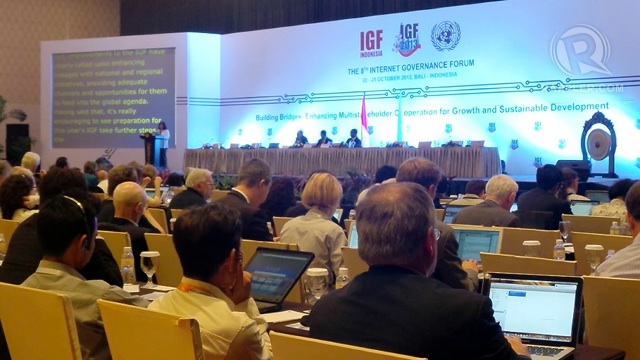SUMMARY
This is AI generated summarization, which may have errors. For context, always refer to the full article.

BALI, Indonesia – “Any surveillance without safeguards to protect the right to privacy hampers fundamental freedoms.”
The United Nations and world leaders expressed alarm over continued reports of mass surveillance, saying it could undermine efforts to promote a free and open Internet.
Reports about the United States’ spying operations became a common topic of speeches during the opening session of the 8th Internet Governance Forum (IGF) here on Tuesday, October 22.
The UN-organized IGF is the leading multi-stakeholder forum discussing public policy issues concerning the Internet.
In his speech, the UN’s Thomas Gass said that while national security and criminal activity may justify the “exceptional use of surveillance,” it should not violate basic freedoms. Gass is the assistant-secretary general for policy coordination and inter-agency affairs at the UN Department of Economic and Social Affairs.
“People should feel secure in the knowledge that their right to communication is not being unjustly scrutinized by the state or any other actor,” said Gass. “We need to work together to find an appropriate balance between security and openness.”
Other leaders from government, civil society and business echoed the call. The Internet Society President Lynn St Amour said surveillance that interferes with citizens’ privacy is wrong.
US officials sought to address the concerns about the leaks from whistleblower Edward Snowden on the US National Security Agency (NSA)’s mass surveillance program known as PRISM. Ambassador Danny Sepulveda, US coordinator for international communications and information policy, addressed the IGF.
“I can assure you the United States takes your concerns, those many of you have expressed about recent NSA disclosures, very, very seriously,” Sepulveda said.
“We should however guard against arguments for centralized, inter-governmental control of the Internet that have used recent news stories about intelligence programs for their justification,” he added.
New reports about the US spying on countries like France and Mexico coincided with the opening of the IGF. France has expressed “deep disapproval” over claims the NSA spied on 70.3 million phone calls in the country from December 2012 to January 2013.
‘We don’t need new organizations’
While concerned about surveillance, many speakers at the IGF also warned against a centralized intergovernmental mechanism and instead pushed for a bottom-up, multi-stakeholder approach to policy making for the Internet.
“The European Parliament has always rejected any idea of making changes to the international telecommunications regime, which would generally give regulatory powers over the Internet to [supernational] government organizations,” said Sabine Verheyen, a member of the European Parliament.
“Centralized governance of the Internet is certainly not desired on a European level,” she added.
The Internet Corporation for Assigned Names and Numbers (ICANN), the global manager of Internet naming resources, said the group and others involved in the technical infrastructure of the Internet are becoming “more international” to fight the perception that they are US-centric.
“While governments are central to Internet governance, government alone cannot govern the Internet,” said ICANN President Fadi Chehadé. “We need multi-stakeholder solutions, to be together on an equal footing.”
“We look at opportunities to ensure that we do not create yet another major new organization [to govern the Internet]. We don’t need more organizations. We have good institutions,” he said.
Internet critical driver for development
Gass and the other global leaders also highlighted the role of the Internet as a tool for development and the promotion of human rights. This year’s IGF is themed “Building Bridges: Enhancing Multistakeholder Cooperation for Growth and Sustainable Development.”
The UN assistant secretary-general said the international community must act to bridge the digital divide, with more than two-thirds of people in developing countries still without access to the Internet. He said by the end of the year, only 40% of the global population will be online.
“The Internet has become a critical driver of and an essential tool for the creation of jobs, and the delivery of basic public services for improving access to knowledge and education, for empowering women, for enhancing transparency and for giving marginalized populations a voice in decision-making processes that directly affect their own life,” Gass said.
Nnenna Nwakanma, African regional coordinator of the World Wide Web Foundation, made a passionate call for action to ensure that the Internet is used for social justice and equity.
“We must therefore continue to [work for] an Internet of opportunities, opportunities for people like me, opportunities for indigenous peoples, opportunities for nomadic people, opportunities for island states, opportunities for countries made up of islands like Indonesia,” she said.
“We must never lose focus that the Internet governance process [must] aim to be a tool for poverty reduction, health service delivery, and education,” she said. – Rappler.com
Add a comment
How does this make you feel?
There are no comments yet. Add your comment to start the conversation.